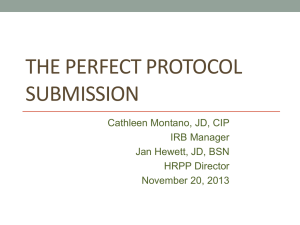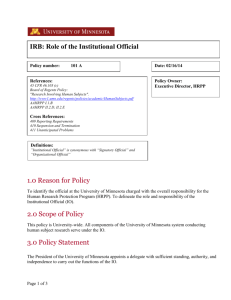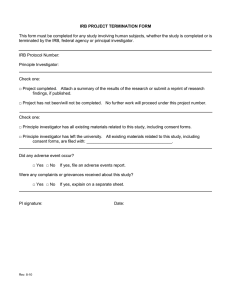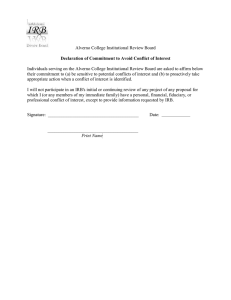21.1 Definitions and Examples XXI:
advertisement
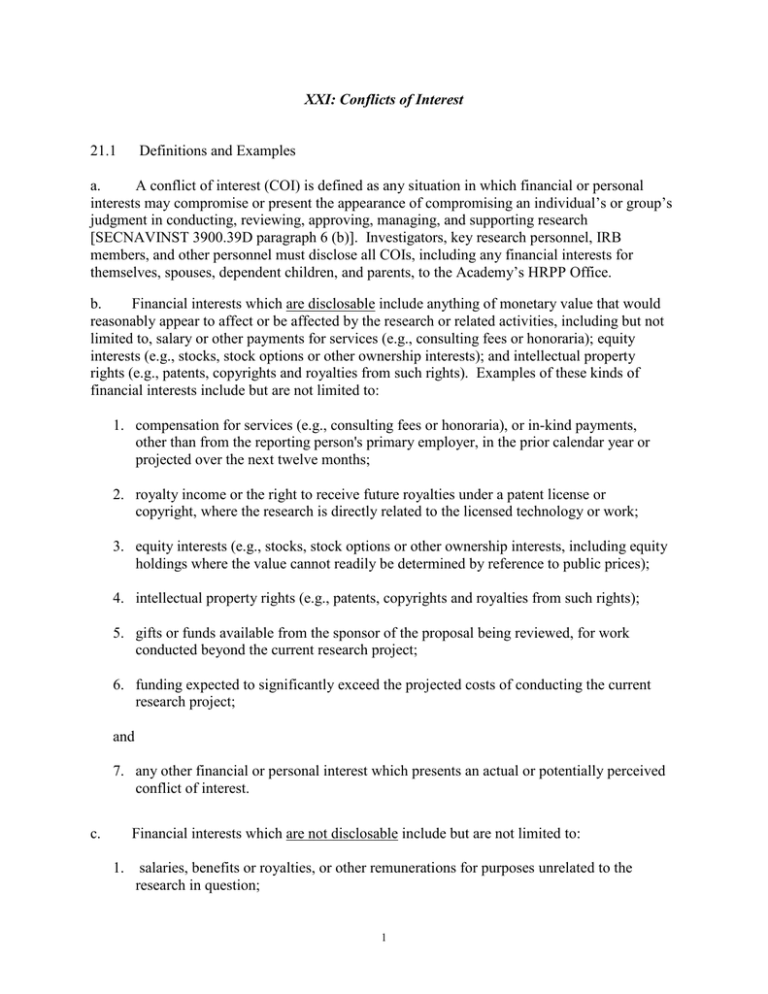
XXI: Conflicts of Interest 21.1 Definitions and Examples a. A conflict of interest (COI) is defined as any situation in which financial or personal interests may compromise or present the appearance of compromising an individual’s or group’s judgment in conducting, reviewing, approving, managing, and supporting research [SECNAVINST 3900.39D paragraph 6 (b)]. Investigators, key research personnel, IRB members, and other personnel must disclose all COIs, including any financial interests for themselves, spouses, dependent children, and parents, to the Academy’s HRPP Office. b. Financial interests which are disclosable include anything of monetary value that would reasonably appear to affect or be affected by the research or related activities, including but not limited to, salary or other payments for services (e.g., consulting fees or honoraria); equity interests (e.g., stocks, stock options or other ownership interests); and intellectual property rights (e.g., patents, copyrights and royalties from such rights). Examples of these kinds of financial interests include but are not limited to: 1. compensation for services (e.g., consulting fees or honoraria), or in-kind payments, other than from the reporting person's primary employer, in the prior calendar year or projected over the next twelve months; 2. royalty income or the right to receive future royalties under a patent license or copyright, where the research is directly related to the licensed technology or work; 3. equity interests (e.g., stocks, stock options or other ownership interests, including equity holdings where the value cannot readily be determined by reference to public prices); 4. intellectual property rights (e.g., patents, copyrights and royalties from such rights); 5. gifts or funds available from the sponsor of the proposal being reviewed, for work conducted beyond the current research project; 6. funding expected to significantly exceed the projected costs of conducting the current research project; and 7. any other financial or personal interest which presents an actual or potentially perceived conflict of interest. c. Financial interests which are not disclosable include but are not limited to: 1. salaries, benefits or royalties, or other remunerations for purposes unrelated to the research in question; 1 2. income from seminars, lectures, teaching engagements or publishing sponsored by federal, state, or local entities or from non-profit academic institutions (e.g., universities, teaching hospitals or academic medical centers) where the origin of the funds is not from corporate sources; 3. income from service on advisory committees or review panels for governmental or nonprofit entities; 4. investments in publicly-traded mutual funds; and 5. gifts and promotional items of nominal value, and meals and lodging for participants in professional meetings. d. A non-financial or personal COI should also be disclosed to the Academy’s HRPP Office by any of the individuals listed above. Generally, this type of COI would involve a set of circumstances that might compromise an IRB member’s ability to objectively review a protocol or an investigator’s ability to conduct research in a manner that safeguards the rights and welfare of the human subjects. Examples of this type of COI could involve an IRB member that is also involved as investigator in a research protocol before the IRB, or as a researcher or research team member who is also involved with human subjects in a capacity other than as an investigator. 21.2 Applicability and Reporting Requirements a. Principal Investigators (PIs), key research personnel, IRB members, consultants, and other personnel must disclose all potential conflicts of interest (financial or personal) to the Academy’s HRPP Office. b. The Academy’s HRPP Office may also determine if an investigator appears to be in a potential COI that could compromise or jeopardize the ethical conduct of the protocol research. c. If the HRPP Office determines (either by self-reporting or by an HRPP Office audit) that an investigator, key research personnel or others designated to assist with a proposed project have potential COI(s), the HRPP Office will notify the Academy’s IRB. The IRB may, in turn, recommend a plan of action to the Academy’s Superintendent to manage the COI(s). A plan of action, tailored to each person with the COI or potential COI, will be coordinated by the Academy’s HRPP Office and approved by the Superintendent. The plan may include, but is not limited to, the following conditions and actions: 1. public disclosure, to the IRB and to the Senior Leadership Team of the Naval Academy, of significant financial interests including any manuscripts or oral presentations based upon the research in question; 2 2. monitoring of research by independent reviewers; 3. modification of the research plan; 4. disqualification of the person(s) with the COI(s) from participation in all or some portion of the proposed research; 5. selection of another investigator or research staff person to perform the research or research-related function; 6. divestiture of significant financial interests; and 7. severance of relationships that create actual or potential conflicts. d. For each protocol: If a member of the Academy’s IRB determines that he/she may have a COI, he/she must notify the Academy’s HRPP Office of this possibility prior to being involved in any discussion or review of a proposed protocol (32 CFR 219.107(e)). At the beginning of every IRB meeting the IRB Chair asks if anyone present (this includes Members, consultants, etc) if they have a COI. It is then cocumented in the IRB Meeting minutes. If it is determined that the member does have an actual, apparent or potential COI, the member must recuse him/herself from all discussions and/or deliberations on the human subject research proposal. The member must leave the meeting room for the final discussion and vote on the proposal and will not be counted as part of the quorum. If this absence causes the quorum to be lost, the proposal will be tabled until a quorum is met, whether later in the meeting or at a future IRB meeting. (Potential COIs for members of the Academy’s IRB include the member being a co-PI on the project, serving as a funding source for the project, etc.) e. The Academy’s HRPP Office and/or IRB may request additional information regarding the nature of the potential conflict from any person directly or indirectly associated with the proposed research. f. The COI status of all investigators, key research personnel, and other personnel associated with a proposed human subject research project must be documented in the HRPP Office records maintained on the proposed project and must be recorded in the minutes of any meetings of the Academy’s IRB convened to discuss the proposed or approved project. Details of any plan of action developed by the Academy’s HRPP Office and approved by the Superintendent to manage the COIs must be included in the HRPP Office records on the project. g. The COI status of the IRB member who recuses him or herself from specific reviews and proceedings associated with a project must be recorded in the minutes of any meetings of the Academy’s IRB convened to discuss the project, the same for a consultant. 3 h. IRB members with conflicting interests may provide information requested by the IRB, but must leave the room (recusal) during the discussion and thus do not count towards quorum. i. If the IRB Chair or Vice Chair has a potential conflict in the determination of exemption or the expedited review process of research the other will review the purposed research. This COI is documented with a check box on the IRB Reviewer forms. It is the same for the review of unanticipated problems involving risks to research participants or non-compliance. 4


